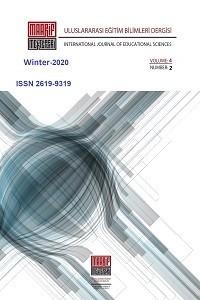The Effects of Socio-Economic Factors on the Demand for Anadolu University Open Education System
The aim of this study is to put forward how the demand for Anadolu University Open Education System is affected by socio-economic factors in the provinces of Turkey. We tried to construct a structural equality model which is called as path analysis. First, factor analysis was applied to socioeconomic variables which were obtained in province basis and three important factors were found. These are the levels of economic development, labor and education in the province. Then, multiple regression analysis was performed between these factors and the variables of Anadolu University Open Education System. As the result of the analysis, we found that economic development and education variables positively affect the demand for Anadolu University Open Education System while labor variables affect negatively. Thus, we have shown the positive contributions of economic development and education levels of the province to the demand for Open Education System. It is not surprising that individuals in the workforce do not benefit from open education. Because, individuals after increasing their skills through open education, generally leave education and join the workforce, with the intention of finding a new job or new initiatives to be employed.
Anahtar Kelimeler:
anadolu
___
- Barro, R. J. (1991). Economic Growth in a Cross Section of Countries, The Quarterly Journal of Economics, 106(2), 407-443.
- Barro, R. J. & Sala-i-Martin X. (1995) Economic Growth, London: The MIT Press, 431.
- Beşkaya, A., Savaş, B. &Şamiloğlu, F. (2010). The Impact of Education on Economic Growth in Turkey, Süleyman Demirel Üniversitesi İktisadi ve İdari Bilimler Fakültesi Dergisi, 15 (3), 43-62.
- Bils, M. & Klenow, P. J. (2000). Does Schooling Cause Growth?, The American Economic Review, 90(5), 1160-1183.
- Brannick, M. T. (2009). Path Analysis, Retrieved December 20, 2009 from http://luna.cas.usf.edu/~mbrannic/files/regression/Pathan.html
- Çalışkan, Ş., Karabacak, M. & Meçik, O. (2013). Türkiye’de Eğitim- Ekonomik Büyüme İlişkisi: 1923-2011 (Kantitatif Bir Yaklaşım), Yönetim Bilimleri Dergisi, 11(2), 29-48.
- Ersöz, S., Pınarbaşı, M., Türker, A. K. & Yüzükırmızı, M. (2009). Hizmet Kalitesinin Servqual Metodu ile Ölçümü ve Sonuçların Yapısal Eşitlik Modelleri ile Analizi: Öğretmenevi Uygulaması, Int. J. Eng. Research & Development, 1(1), January, 19-27
- Kalaycı, Ş. (2008). SPSS Uygulamalı Çok Değişkenli İstatistik Teknikleri, Asil Yayın Dağıtım
- Kavak, Y. (1990). Kalkınmada Öncelikli Yörelerdeki Yükseköğretim Kurumlarının Çevreye Dönük Faaliyetleri, Türkiye Ticaret, Sanayi, Deniz Ticaret Odaları ve Ticaret Borsaları, TOBB 40 yıl, TOBB yayın no: Genel 157, Ar-Ge 67, ISBN: 975-512-053-X, Afşaroğlu Matbaası, Ankara
- Kar, M. & Ağır, H. (2003) Türkiye’de Beşerî Sermaye ve Ekonomik Büyüme: Nedensellik Testi, Tebliğ, II. Ulusal Bilgi, Ekonomi ve Yönetim Kongresi, 17-18 Mayıs 2003, Kocaeli Üniversitesi, Derbent-İzmit.
- Kasliwal, P. (1995). Development Economics, S. Western Collage Publishing, Ohio.
- Mincer, J. (1996). Economic Development, Growth of Human Capital, and the Dynamics of the Wage Structure, Journal of Economic Growth, 1, 29-48.
- OECD (1995). Education at a Glance: OECD Indicators. Paris, OECD CERI. 39
- Orhunbilge, A. N. (2010). Çok Değişkenli İstatistiksel Yöntemler, İstanbul Üniversitesi Yayn No: 4942, İşletme Fakültesi Yayın No: 286, ISBN: 978-975-404-870-4
- Özgür, E. (2005). Türkiye’de Kalkınmaya Yönelik Eğitim Politikaları ve Eğitim Yatırımlarının Geri Dönüşü, Basılmamış Yüksek Lisans Tezi, Eskişehir Osmangazi Üniversitesi, Eskişehir.
- Pek, H. (1999). Nedensel Modeller, Yayımlanmamış Yüksek Lisans Tezi, Gazi Üniversitesi, Fen Bilimleri Enstitüsü.
- Seyidoğlu, H. (1993). Uluslararası İktisat, Gizem Yayınları, 9. Baskı, İstanbul.
- Şimşek, A. (2015). Erişilebilir Şehirler ve Bölgeler: Erişilebilirliğin Bölgesel Kalkınmaya Etkisi ve İller Bazında Erişilebilirlik endeksinin Geliştirilmesi, T. C. Kalkınma Bakanlığı, Bölgesel Gelişme ve Yapısal Uyum Müdürlüğü, ISBN: 978-605-9041-59-1, Yayın No: 2945
- Şimşek, M. & Kadılar, C. (2010). Türkiye’de Beşerî Sermaye, İhracat ve Ekonomik Büyüme Arasındaki İlişkinin Nedensellik Analizi, Cumhuriyet Üniversitesi İktisadi ve İdari Bilimler Fakültesi, 11(1), 115-140.
- Taban, S. & Kar, M. (2006) Beşerî Sermaye ve Ekonomik Büyüme: Nedensellik Analizi, 1969-2001, Anadolu Üniversitesi Sosyal Bilimler Dergisi, 6(1), 159-181.
- Taş, U. & Yenilmez, F. (2008). Türkiye’de Eğitimin Kalkınma Üzerindeki Rolü ve Eğitim Yatırımlarının Geri Dönüş Oranı, Eskişehir Osmangazi Üniversitesi, Sosyal Bilimler Dergisi, 9(1), 155-186.
- Zafar M. N. & Hina N. (2000). Education and Earnings in Pakistan, Pakistan Institute of Development Economics, No: 177, 1.
- Yayın Aralığı: Yılda 2 Sayı
- Başlangıç: 2017
- Yayıncı: Maarif Mektepleri
Sayıdaki Diğer Makaleler
Öğrenme Stilleri Modellerinin İncelenmesi
Meliha ASLAM ORKUN, Ayşe BAYIRLI
Astronomi Başarı Testi Geliştirme: Geçerlik ve Güvenirlik Çalışması
Fulya ÖNER ARMAĞAN, Nagehan DEMİR
The Effects of Socio-Economic Factors on the Demand for Anadolu University Open Education System
Bahar BERBEROĞLU, Rabia Ece OMAY, Cafer Necat BERBEROĞLU, Çağlar KARADUMAN
